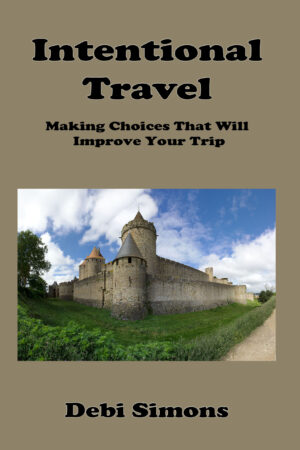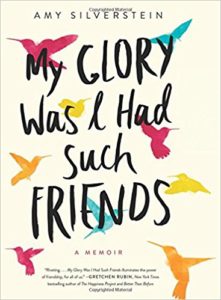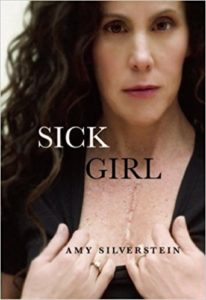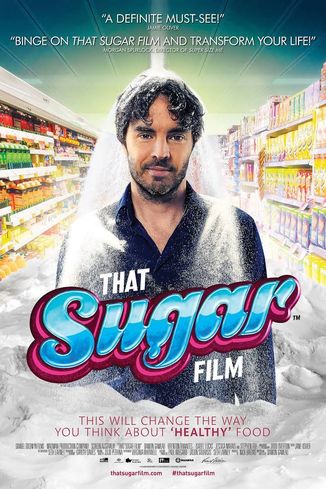 Jim and I have been going on big trips ever since we got married almost 28 years ago. Most of our traveling has been in the US, but we’ve now made three international trips together. Back in the summer of 2018 we spent a blissful three weeks in France to celebrate our 25th anniversary (one year late). I was struck with a number of tips and ideas that don’t show up in regular travel books or are given a slant with which I don’t agree. So I decided to write a brief travel book of my own, spelling out some of these unconventional ideas. Jim has recently revised it and gotten it up as an e-book on this site and as a paperback and Kindle edition on Amazon. I’d encourage you to get a copy if you’re planning any type of trip, even if you’re not going to Europe. My emphasis is on that area because that’s where we’d just gone, but my ideas are widely applicable. There’s an appendix with tipping info for most of the countries in Europe; I don’t have anything about tipping in, say, Japan, but that’s the sort of thing that’s easily accessible online. Who’s going to tell you, though, to:
Jim and I have been going on big trips ever since we got married almost 28 years ago. Most of our traveling has been in the US, but we’ve now made three international trips together. Back in the summer of 2018 we spent a blissful three weeks in France to celebrate our 25th anniversary (one year late). I was struck with a number of tips and ideas that don’t show up in regular travel books or are given a slant with which I don’t agree. So I decided to write a brief travel book of my own, spelling out some of these unconventional ideas. Jim has recently revised it and gotten it up as an e-book on this site and as a paperback and Kindle edition on Amazon. I’d encourage you to get a copy if you’re planning any type of trip, even if you’re not going to Europe. My emphasis is on that area because that’s where we’d just gone, but my ideas are widely applicable. There’s an appendix with tipping info for most of the countries in Europe; I don’t have anything about tipping in, say, Japan, but that’s the sort of thing that’s easily accessible online. Who’s going to tell you, though, to:
health
Keto Case Study #4–Stay Away from Gurus!
 This is the final post for now about the problems with following the so-called “ketogenic” diet. Today I’m addressing some issues I’ve discovered with one of the leading keto gurus, Eric Berg DC. Note that I don’t call him “Dr.” Berg, even though that’s what his YouTube channel, his books, his website and his ads call him. HE IS NOT A MEDICAL DOCTOR. HE’S A CHIROPRACTOR. Sorry. I try to steer clear of all-caps ranting, but sometimes it’s just necessary.
This is the final post for now about the problems with following the so-called “ketogenic” diet. Today I’m addressing some issues I’ve discovered with one of the leading keto gurus, Eric Berg DC. Note that I don’t call him “Dr.” Berg, even though that’s what his YouTube channel, his books, his website and his ads call him. HE IS NOT A MEDICAL DOCTOR. HE’S A CHIROPRACTOR. Sorry. I try to steer clear of all-caps ranting, but sometimes it’s just necessary.
Just a reminder: the “case study” I’m using is that of the blogger who runs the Addicted2Decoraing website. She says in a post titled “The Personal Stuff: A New Furry Family Member, More Keto Info, and What I’m Listening To” that one of her five ways to get started on the ketogenic diet is:
Find one keto expert you like and trust, and stick with him or her.
And the “expert” she’s decided to follow is Eric Berg DC. Now why on earth would you want to “stick with” just one source? That makes no sense. The best way to get a balanced view of any topic is to consult multiple sources, checking out the discrepancies that you find. Then you make your own well-informed decisions. Otherwise you’re just outsourcing your choices. (And, as I’ve said before, I love this blog, follow it faithfully, and totally respect its author. She’s so independent in her decorating choices that I find it very puzzling that she’s willing to blindly follow anyone about her health choices.)
In Which I Disagree with the New York Times and the Medical Establishment—Part One
 Oh my goodness! I don’t know that I’ve ever seen as much nonsense packed into two sentences as with these:
Oh my goodness! I don’t know that I’ve ever seen as much nonsense packed into two sentences as with these:
Only bariatric surgery reliably leads to long-term weight loss. Now scientists hope to duplicate the effects with a pill.
I mean to say, have you ever in your life read something so silly? I’m sure I haven’t, and that’s taking in a lot of territory. I have a New York Times subscription, mainly so I can watch Melissa Clark’s food videos, but I do take a look at their front page fairly regularly, and this little gem was lurking there:
A Watery Happiness Hack
 Yes, I know. We’re all so tired of being told to drink lots of water. And there’s plenty of evidence out there that the whole thing has been somewhat overblown. The original standard of eight glasses of water a day came from a paper written back in the 1940’s, and references to that study usually don’t include its caveat that much of the needed water comes from food. Also, other liquids besides water count. So if you drink orange juice (which you shouldn’t be doing, as it’s just sugar water, but never mind), or coffee, tea, or other beverages, all of those count as water. (Contrary to a very silly idea that circulated for awhile, coffee doesn’t cause you to excrete more water than was in the coffee to begin with.) The current state of medical advice is that your body will tell you if you need water, because guess what? You’ll feel thirsty.
Yes, I know. We’re all so tired of being told to drink lots of water. And there’s plenty of evidence out there that the whole thing has been somewhat overblown. The original standard of eight glasses of water a day came from a paper written back in the 1940’s, and references to that study usually don’t include its caveat that much of the needed water comes from food. Also, other liquids besides water count. So if you drink orange juice (which you shouldn’t be doing, as it’s just sugar water, but never mind), or coffee, tea, or other beverages, all of those count as water. (Contrary to a very silly idea that circulated for awhile, coffee doesn’t cause you to excrete more water than was in the coffee to begin with.) The current state of medical advice is that your body will tell you if you need water, because guess what? You’ll feel thirsty.
The Four Tendencies and Food–What I Talked About this Weekend at Camp
 I just had a wonderful weekend at Camp Elim, a Christian camp near Colorado Springs, where I was privileged to speak in a couple of workshops. My two topics were “What’s Your Tendency?”, an examination of Gretchen Rubin’s theory about the four ways that people respond to expectations, and “How Food Fads and Myths Can Harm You,” in which I took on some of the current ideas floating around in the eating theories world, with a few side trips into my views on alternative medicine. I may get myself into trouble with that second one! My actual group for that session was small as I was competing with a very popular one on marriage, and they all seemed very receptive to my ideas. I gave everyone who attended the sessions the opportunity to sign up for a resources page, so I decided to just turn that material into a post for all my readers to access. Here ’tis:
I just had a wonderful weekend at Camp Elim, a Christian camp near Colorado Springs, where I was privileged to speak in a couple of workshops. My two topics were “What’s Your Tendency?”, an examination of Gretchen Rubin’s theory about the four ways that people respond to expectations, and “How Food Fads and Myths Can Harm You,” in which I took on some of the current ideas floating around in the eating theories world, with a few side trips into my views on alternative medicine. I may get myself into trouble with that second one! My actual group for that session was small as I was competing with a very popular one on marriage, and they all seemed very receptive to my ideas. I gave everyone who attended the sessions the opportunity to sign up for a resources page, so I decided to just turn that material into a post for all my readers to access. Here ’tis:
Yet Another Anti-Sugar Rant
 Hope I’m not sounding like a broken record here, but I wanted to share some recent experiences with sugar intake that might save some of you from needlessly depriving yourselves of grain products. Many if not most people who think that going gluten-free is going to make them healthier are buying into a false premise. This is not to say, and I want to emphasize this point, that there isn’t real gluten intolerance, with the most extreme of course being full-blown celiac disease. But most of us need to cut out sugar, not gluten.
Hope I’m not sounding like a broken record here, but I wanted to share some recent experiences with sugar intake that might save some of you from needlessly depriving yourselves of grain products. Many if not most people who think that going gluten-free is going to make them healthier are buying into a false premise. This is not to say, and I want to emphasize this point, that there isn’t real gluten intolerance, with the most extreme of course being full-blown celiac disease. But most of us need to cut out sugar, not gluten.
Stay Off That Bandwagon!
 It’s the old “drunk on the horse” scenario once again. We humans can’t seem to stay in the middle of the road, no matter how hard we try. The fad of the moment takes over and people start going to extremes. The bandwagon starts filling up. Nowhere is this tendency more evident than in the area of food. Because we’re so rich and so well-fed, indeed overly well-fed, we have the luxury of developing food fads. Believe me, people who are living on the verge of starvation don’t have any time for worrying about their cholesterol. They just need something to eat.
It’s the old “drunk on the horse” scenario once again. We humans can’t seem to stay in the middle of the road, no matter how hard we try. The fad of the moment takes over and people start going to extremes. The bandwagon starts filling up. Nowhere is this tendency more evident than in the area of food. Because we’re so rich and so well-fed, indeed overly well-fed, we have the luxury of developing food fads. Believe me, people who are living on the verge of starvation don’t have any time for worrying about their cholesterol. They just need something to eat.
Read about a Sick Girl–and Count Your Blessings!


Both images are from their respective Amazon pages; click on the image to be taken to the appropriate page. I used my two available Audible.com credits to get these books in audio form and am almost finished with Sick Girl.
I’m not going to write much in the way of commentary here because it’s not needed. The book covers should tell you all you need to know about the worth contained between them. For those of us who are reasonably healthy, it’s good to be reminded of how precious that health and life is. It’s also helpful to be reminded of how utterly tactless we can be to those who are suffering. Even doctors and nurses–maybe even especially them–can add to the patient’s pain by their manner and words.
For an interesting and informative interview with Amy Silverstein about her second book (and her second heart transplant), go–where else?–to Gretchen Rubin’s recent blog post:
“I Simply Have to Put All My Energy into Hope and Life, Rather Than Trying to Avoid Doom and Death.”
That article will sell you on the books if nothing else will. You can get paper or digital versions at your library if you’d like. I was not able to find the audio versions at mine and thus went through Audible.
Yet Another Sugar Screed
 That Sugar Film, 2015, written and directed by Damon Gameau, who also stars. Streaming is available for free through Amazon Prime, or you can rent to stream or buy the DVD if you’re not a Prime member. Also available through Netflix.
That Sugar Film, 2015, written and directed by Damon Gameau, who also stars. Streaming is available for free through Amazon Prime, or you can rent to stream or buy the DVD if you’re not a Prime member. Also available through Netflix.
I don’t want to wear out my welcome here, so if you’re kind of weary of the whole “sugar is evil” hoopty-doo feel free to skip this. However, Jim and I thoroughly enjoyed this film, and it’s a pretty painless way (except for the tooth-extraction scene) to find out a little more about the silent white killer. (Cue ominous music. And full disclosure: I just caved in and ate three smallish peanut-butter cookies that my husband made this weekend. They were calling out to me from the freezer. But I won’t say that I couldn’t resist. I could. I just didn’t. So sue me!)
Gameau is an actor who decided to make a documentary about what would happen to him if, after about three years of eating a very healthful, low-to-no-sugar diet, he deliberately ate 40 teaspoons of sugar every day for 60 days, yet another one of those “stunt journalism” stunts, akin to “Supersize Me,” the 2004 film in which Morgan Spurlock, an American filmmaker, ate nothing but McDonald’s food for a month.
The Ongoing Sugar Struggle
 I write periodically about the dangers of sugar consumption and my own efforts to control if not banish this substance from my life. Right now I’m working on re-doing my recipes over on the hospitality blog, and for every dessert I’m including information on how many grams of sugar each serving contains. The typical amount is around 25 grams, or about 6 teaspoons, which, coincidentally, is the limit given by most researchers for the daily maximum we should have for added sugar.
I write periodically about the dangers of sugar consumption and my own efforts to control if not banish this substance from my life. Right now I’m working on re-doing my recipes over on the hospitality blog, and for every dessert I’m including information on how many grams of sugar each serving contains. The typical amount is around 25 grams, or about 6 teaspoons, which, coincidentally, is the limit given by most researchers for the daily maximum we should have for added sugar.